
There are many models for developing an exciting idea and building a successful organisation. One approach is to maintain the sense of entrepreneurship, build an engine and continue to deliver excellence. Let’s explore these three steps.
The Entrepreneurship
Imagine that you are part of a leadership team in a start up company or that you want to scale a business idea within a larger organisation. Here are some steps to consider at the entrepreneurial stage.
Start with an idea that will deliver success
This is the spark. Sometimes the idea may be innovative. Sometimes it may imitate or improve an existing idea. Sometimes it may simply be a way to improve implementation.
Show how the idea will deliver success
Success breeds success. So show how the idea will deliver the goods. Demo or Die is the motto. It is important to get your first customer or build a prototype that produces tangible benefits.
Show how the idea can be scaled and get
backing for delivering this greater success
Some entrepreneurial ideas can be delivered by an individual. Others may need to be implemented on a larger scale. This may call for building some kind of engine that will deliver excellence.
Imagine that you want to follow the latter course. It will be vital to show how harnessing these resources will benefit the organisation.
Making this happen successfully may call for getting backing from the key decision makers. It will probably be important to demonstrate a clear business case. So you may wish to present the following steps.
The What: The specific results it will deliver – the picture of success.
The Why: The specific benefits to the organisation.
The How: The specific strategies that will deliver success.
The Who: The specific responsibilities of various people in delivering success.
The When: The specific milestones that will be achieved by when on the road to delivering success.
If you wish, try tackling the exercise on this theme. This invites you to do the following things.
Describe the specific entrepreneurial idea that you would like to implement.
Describe the specific benefits – for your customers, employer or organisation – of implementing the idea.
Describe the specific things you can do to get backing for the idea and, if appropriate, the necessary support for building the engine.
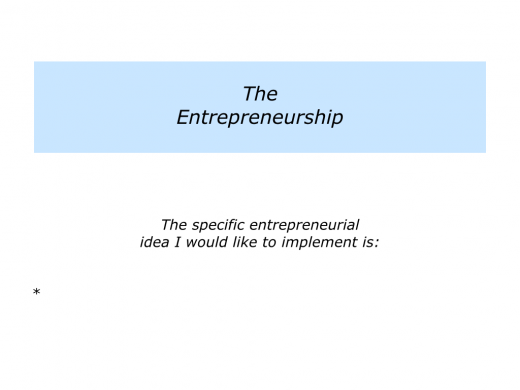
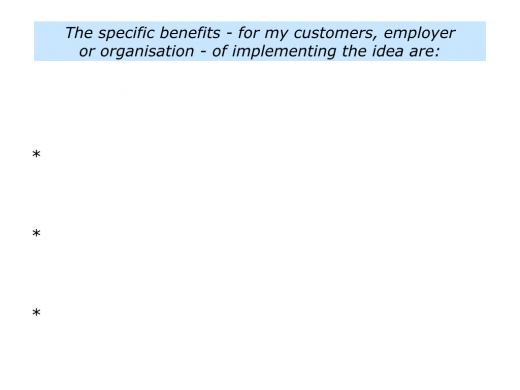
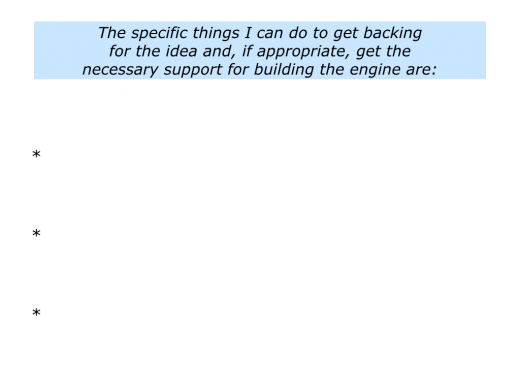
The Engine
Let’s assume you have got the necessary sign off for implementing the idea. The entrepreneurial spark can provide the idea, but you may need to build an engine to deliver success.
Engines can take many different forms, but the following steps are often required. It will be important to clarify:
The specific results to achieve – the picture of success.
The strategies for achieving the picture of success.
The system – the principles and processes – for delivering success.
The support required to deliver success.
The staff – the right people – who will set up and run the engine to deliver success.
You will need to ensure that the right strategies are implemented by the right people in the right way. So the people must be implementers who want to make things work.
There is no point in trying to coax or coach people who don’t have the right attitude or aptitude. One leader described his approach in the following way.
“My strength lies in producing strong commercial ideas. I can outline and oversee the strategic plan and make sure it delivers the required results. My weaknesses lie in doing the day-to-day implementation.
“My best work has been done when working with a good coordinator who has shared similar professional standards. They have translated the strategy into action and made sure that things worked on the ground.
“I also follow Jim Collins’ idea of getting the right people in the right places on the bus. This increases the chances of people doing superb work and delivering success.”
If you wish try tackling the exercise on this theme. This invites you to do the following things.
Describe the specific entrepreneurial idea you want to pursue.
Describe the specific things you can do to ensure people build the engine and it works successfully.
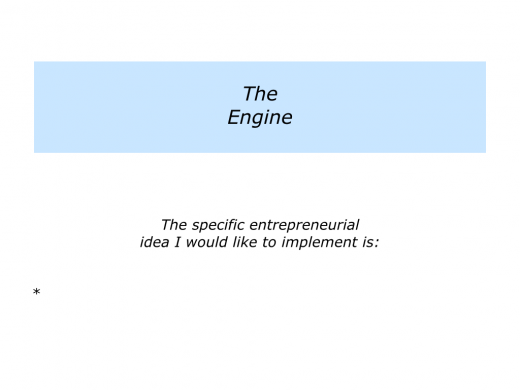
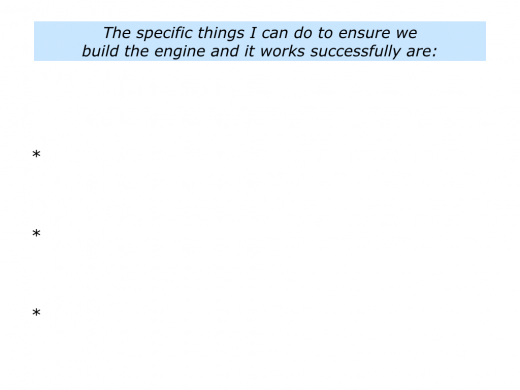
The Excellence
Leaders need to ensure that the organisation delivers consistently high standards. If the engine does not work, however, they can spend much of their time fixing daily problems.
Imagine you want to ensure that people continue to run the engine and deliver excellence. Let’s explore some steps you can take.
You can continue to employ the right people
and ensure they run the engine successfully
As mentioned earlier, it is vital to employ people who enjoy making things work on a daily basis. You will need a key mission holder takes responsibility for delivering the goods.
This mission holder needs to lead a team of people who are committed: a) to running the engine and maintaining high standards; b) to doing what is required to help their stakeholders happy.
This is vital for several reasons. First, it will be important to make sure the daily systems keep working. This will provide a platform for helping the organisation to achieve success.
Second, it will also be important keep their key stakeholders happy and at bay. The last thing they want is for senior people donning their overalls and making impromptu visits to instruct them how to run the engine.
You can encourage people to build a self-managing
team that ensures the engine runs successfully
Looking at your own role, at some point it may be important to help the team to become more self-managing. One approach is for you to take the following steps:
To employ people who want to be self-managing and also want to ensure the engine keeps running;
To, at an appropriate time, meet with the team to ask them if they would like to become more self-managing;
To make clear contracts with them about: a) the specific outcomes to be delivered; b) the role they want to play in running the engine; c) the role they want you to play; d) the support they need and the specific things they will do to proactively keep you informed.
You can build and maintain a culture
in which people deliver excellence
You can keep in touch with the mission holder and other key people. They will be doing a vital but sometimes unglamorous job. Such people can be taken for granted.
Whilst they may be self-managing, it can be useful to meet with them to have regular one-to-ones. You can then aim a) to provide them with the necessary support; b)) to help them to maintain the job satisfaction and also focus on their professional development.
You can continue to publish success stories. People who run the engine may be soul players who don’t go in for self-promotion. It can therefore be useful to highlight the principles people are following to run the engine successfully.
You can encourage people to keep meeting with their stakeholders. They can get feedback on: a) the specific things they are doing well; b) the specific things they could do better; c) the specific things they could do to deliver excellence to their stakeholders.
If you wish, try tackling the final exercise on this theme. This invites you to do the following things.
Describe the specific entrepreneurial idea you want to pursue.
Describe the specific things you can do to ensure that you and the team implement the idea successfully and continue to deliver excellence.
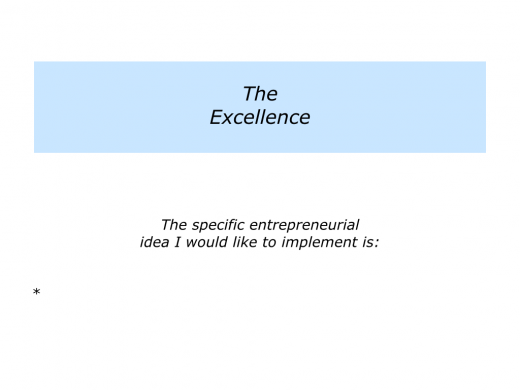
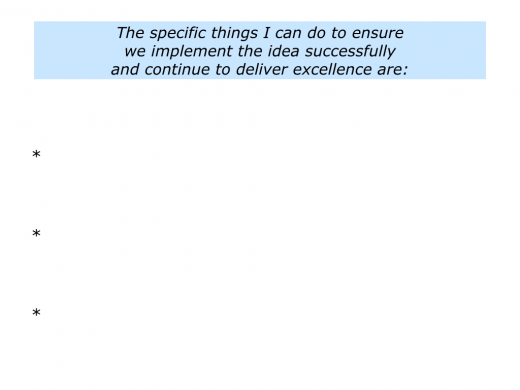






Leave a Reply